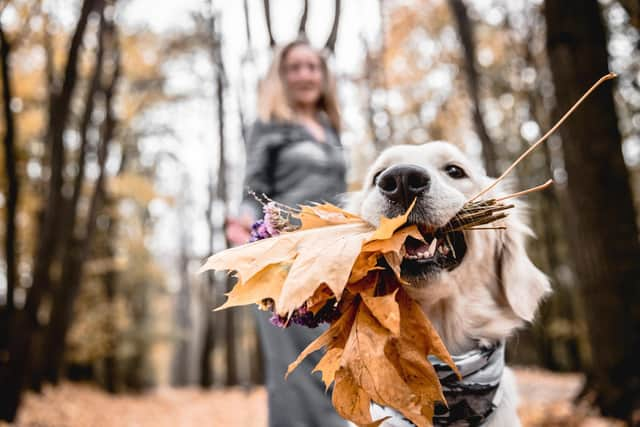Beware harmful blooms on your wintry dog walk
This article contains affiliate links. We may earn a small commission on items purchased through this article, but that does not affect our editorial judgement.


As the air becomes crisp, it’s the perfect time for a stroll with our pooches.
But, among picturesque wintry scenes, there are plants that can be harmful to our furry friends.
Advertisement
Hide AdAdvertisement
Hide AdPDSA Vet Nurse Nina Downing said: “Many of us look forward to long walks admiring the gorgeous colours of the environment as the seasons change, but it’s important to be aware of the dangers some autumn blooms can pose for our pets. Luckily, by understanding which plants to look out for, we can help them keep safe while enjoying the best of the season.”


She warns to avoid toxic plants. “Seeing conkers and acorns on the ground is a sure sign that autumn is upon us, but they can be dangerous for our pets if they are swallowed. Not only can they cause serious, and sometimes fatal, intestinal blockages, but they contain toxins which can put our pets at serious risk.
“When out on woodland walks, fungi are a regular sight, but while many varieties are harmless to pets, some can be dangerous if eaten. Fungal spores can also irritate eyes and sensitive skin, so it’s therefore best for pets to steer clear of overgrown forest floors and stick to paths, avoiding undergrowth.
“It’s also important to be wary of berries. Although some, such as blackberries, are harmless, there are many that, although a staple food for birds, can be harmful if eaten by humans and four-legged friends alike, so it’s best to avoid them altogether if you see them when out and about.”
Advertisement
Hide AdAdvertisement
Hide AdAnd avoid dangers. “If your pet enjoys spending time outdoors, be sure to check your garden to see what plants you have growing and, before planting anything new, speak to your local garden centre for advice on pet-safe blooms.


“Amaryllis, Chrysanthemums, and Hydrangeas are some examples of common flowers found in avid gardeners’ outdoor spaces, but they can be toxic for dogs and cats if eaten.
“If you do have any toxic plants growing, take measures to avoid your pet coming to any harm. Ideally remove the plants altogether but if this is not an option, barriers around the area will help avoid furry family members coming into contact with them.
"While out on a walk, always be mindful of your pet’s whereabouts and, while it can sometimes be easier said than done, discourage them from eating plants which could potentially cause harm. Downloading an app on your phone to help you identify plants is another way to check on any you are unsure of.”
Advertisement
Hide AdAdvertisement
Hide AdSigns of poisoning could be vomiting, diarrhoea, drooling, confusion, lethargy or collapse – signs your pet may have consumed something dangerous. (photos: Adobe)
Expert advice from vet Nina Downing
Dear PDSA vet, my dog Marley has sadly started experiencing seizures, our vet saying he will probably continue to have them. What can I do to help when he’s having a fit? Annie
Dear Annie, hard as it is to see Marley seizure, when it happens, stay calm. Keep children and pets away, clear space around Marley, and make the room dark and quiet. If he’s raised on furniture, gently lift him down if it’s safe to do so. Don’t restrain or comfort him. This could lead to either of you being injured. After seizures, Marley may be dazed and confused. Find him somewhere quiet and comfortable to recover. Keep a seizure diary, listing what time the seizure happened, how long it lasted and Marley’s symptoms. If a seizure lasts longer than five minutes, or he has more than one in a day, call your vet immediately. For further advice please visit https://www.pdsa.org.uk/pet-fits-first-aid website.
Dear PDSA vet, one of my cats bit the other while playing and, while he seems OK, I am worried he’s been hurt. Is there anything I can do? Anonymous
Advertisement
Hide AdAdvertisement
Hide AdCats often bite while playing as they are practicing their hunting skills, though play fighting bites rarely break the skin. However, if your furry friend has suffered a particularly nasty bite, I’d recommend visiting your vet for treatment. There are a few things to look out for to make sure your cat's bite isn’t becoming infected, including loss of appetite, lethargy or the area where the wound is located feeling hot to touch. Similarly, if the wound starts to swell, becomes red or your cat repeatedly licks the area, it’s time to visit your vet for treatment. Cats can be territorial over their home and if biting is due to fighting rather than a part of normal play, find further advice at https://www.pdsa.org.uk/cat-fights site.
Dear PDSA vet, I’m thinking about getting my cat Bella, neutered. What would this process look like? Fabien
Dear Fabien, in female cats neutering (or spaying) is an operation that involves a general anaesthetic and surgery to remove the ovaries and uterus (womb). Cats usually recover quickly and most go home the same day. However, Bella will need to stay inside at home to recover for up to two weeks before being able to go outdoors. The procedure can be carried out from four months, but you can wait longer if your kitten is small for their age or if your vet advises a delay. The benefits of having Bella spayed include preventing the interest of male cats, ovarian and uterine cancers, pyometra (an infection of the uterus), and pregnancy. Visit www.pdsa.org.uk/cat-neutering for more. After being neutered, Bella will no longer come into heat.